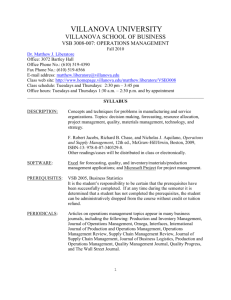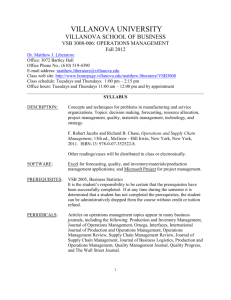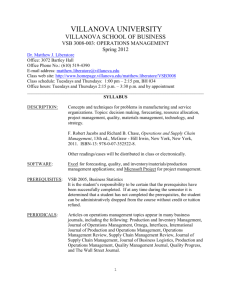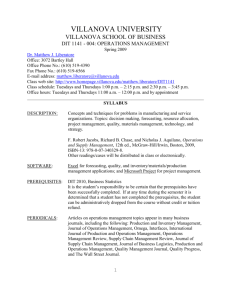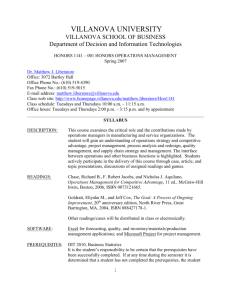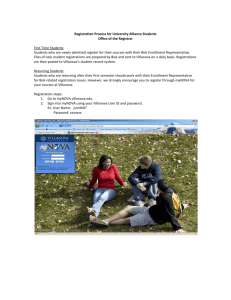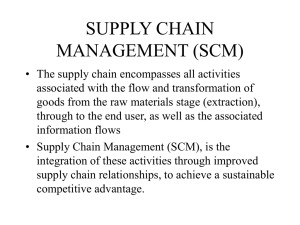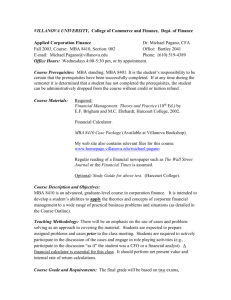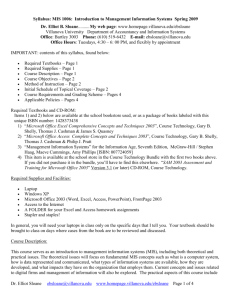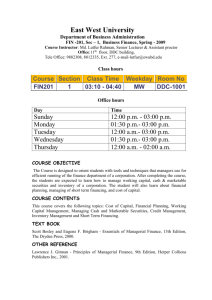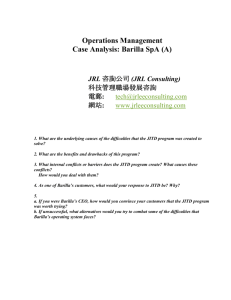course objectives - Villanova University
advertisement
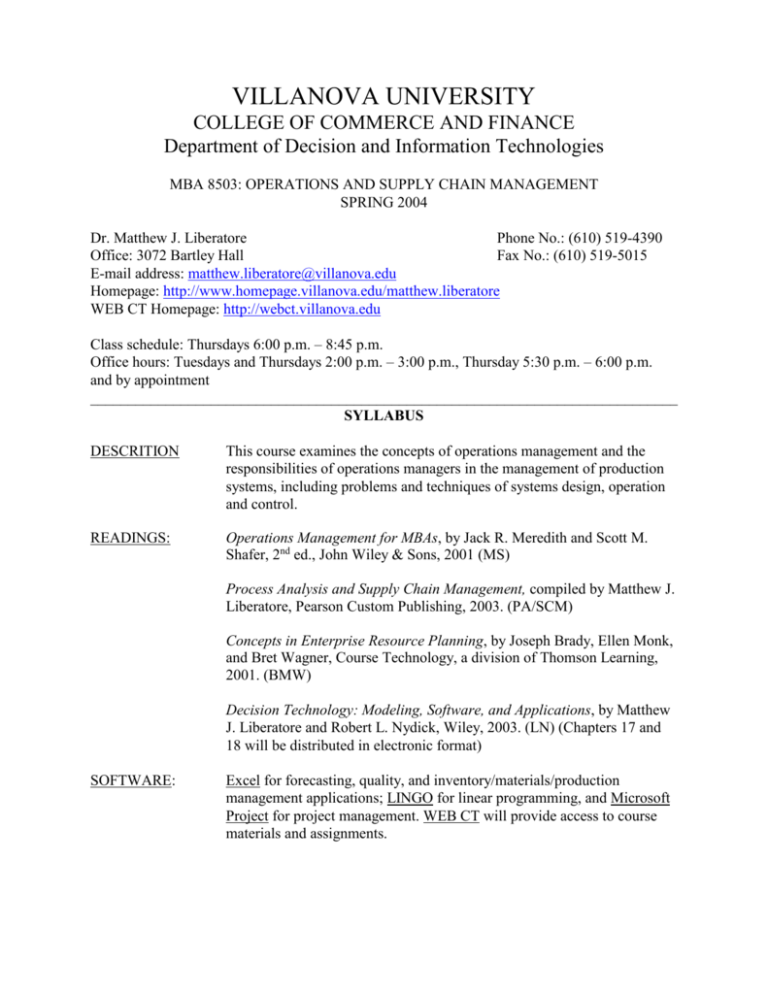
VILLANOVA UNIVERSITY COLLEGE OF COMMERCE AND FINANCE Department of Decision and Information Technologies MBA 8503: OPERATIONS AND SUPPLY CHAIN MANAGEMENT SPRING 2004 Dr. Matthew J. Liberatore Phone No.: (610) 519-4390 Office: 3072 Bartley Hall Fax No.: (610) 519-5015 E-mail address: matthew.liberatore@villanova.edu Homepage: http://www.homepage.villanova.edu/matthew.liberatore WEB CT Homepage: http://webct.villanova.edu Class schedule: Thursdays 6:00 p.m. – 8:45 p.m. Office hours: Tuesdays and Thursdays 2:00 p.m. – 3:00 p.m., Thursday 5:30 p.m. – 6:00 p.m. and by appointment ______________________________________________________________________________ SYLLABUS DESCRITION This course examines the concepts of operations management and the responsibilities of operations managers in the management of production systems, including problems and techniques of systems design, operation and control. READINGS: Operations Management for MBAs, by Jack R. Meredith and Scott M. Shafer, 2nd ed., John Wiley & Sons, 2001 (MS) Process Analysis and Supply Chain Management, compiled by Matthew J. Liberatore, Pearson Custom Publishing, 2003. (PA/SCM) Concepts in Enterprise Resource Planning, by Joseph Brady, Ellen Monk, and Bret Wagner, Course Technology, a division of Thomson Learning, 2001. (BMW) Decision Technology: Modeling, Software, and Applications, by Matthew J. Liberatore and Robert L. Nydick, Wiley, 2003. (LN) (Chapters 17 and 18 will be distributed in electronic format) SOFTWARE: Excel for forecasting, quality, and inventory/materials/production management applications; LINGO for linear programming, and Microsoft Project for project management. WEB CT will provide access to course materials and assignments. PREREQUISITES: MBA 8502 – Statistical Analysis for Business Decisions or equivalent It is the student’s responsibility to be certain that the prerequisites have been successfully completed. If at any time during the semester it is determined that a student has not completed the prerequisites, the student can be administratively dropped from the course without credit or tuition refund. PERIODICALS Interfaces International Journal of Operations and Production Management International Journal of Operations and Quantitative Management Journal of Business Logistics Journal of Operations Management Journal of Supply Chain Management Operations Management Review Production and Inventory Management Journal Production and Operations Management Quality Management Journal Quality Management Progress Supply Chain Management Review Wall Street Journal Articles on Operations Management topics also appear in most major business publications. COURSE OBJECTIVES: 1. To gain an appreciation of the responsibilities and decision-making activities of operations and supply chain managers 2. To recognize and formulate a variety of operations and supply chain management problems that are faced by management in business organizations 3. To choose the appropriate technology to solve and critically analyze operations and supply chain management problems 4. Be better prepared to discuss the global and cross-functional integration issues related to operations and supply chain management within business organizations METHOD: This course stresses the factors that impact the performance of operations managers and the methods that have value to them. The course includes lectures and discussion of theory and hands-on, practical exercises to provide both a sound base of learning and an opportunity to test and develop skill. Students are expected to read the material and be prepared for each class. Software is used to support the quantitatively intensive topics. Global and ethical issues will be integrated throughout the class. WEB CT is used to support the delivery of course materials 2 and assignments. EXAMINATIONS: Examinations 1 and 2 are unit exams and require the use of software for the solution of some questions. About 65-75% of the points in each exam relate to quantitative questions, and the remainder relate to qualitative questions. BOTH EXAMS ARE OPEN BOOK, OPEN NOTES, OPEN COMPUTER. Students will not have access to the Villanova network and the Internet during the examinations. It is important to remember that time is limited during the exams, so those students who are well prepared and only occasionally refer to their notes tend to perform very well. NO MAKEUP EXAMINATIONS WILL BE GIVEN. Points associated with a missed exam will be added to a comprehensive final examination. HOMEWORK: The purpose of the homework assignments is to help you develop skill in learning the material, solving the problems, using the software, and preparing you for the examinations. There will be approximately ten homework assignments. Each homework assignment will be comprised of several questions and is worth a total of five points. The full five points are awarded if all of the questions are attempted, whether or not completely correct. Partial credit will be assigned if all questions are not attempted. NO HOMEWORK SUBMISSIONS ON DISK OR BY EMAIL WILL BE ACCEPTED. Homework submitted after the class due but before the next class will be accepted, but two points will be deducted for lateness. A grade of zero will be recorded for a missed homework. NO MAKEUP HOMEWORK ASSIGNMENTS WILL BE GIVEN. Students are allowed to generally discuss the assignment and potential solutions with one another. However, EACH STUDENT MUST PREPARE AND SUBMIT HIS/HER OWN HOMEWORK SOLUTIONS. Copying another student’s homework is a violation of the Academic Integrity Policy. Homework solutions for all questions will be available on WEB CT. GROUP CASE: Students will form project teams of at most four students to work on the Barilla Case. Each team is required to prepare a written case report and deliver a ten minute presentation on their assigned case question during the next-to-last class. 3 CLASS PRESENTATION: Groups of two students will make a class presentation of no more than 5 minutes on an operations or supply chain topic selected in consultation with the instructor. This presentation should be based on one or more articles and/or websites relating to the selected topic. A written presentation summary and a copy of the article(s) and/or printouts of key website information must be submitted. I will assign a grade based on the quality of the presentation and written report. GRADING: Homework and class presentation Barilla case report and presentation First Examination Second Examination Total 10% 20% 40% 30% 100% FINAL GRADES: A 100 – 92 A91 - 89 B+ 88 – 86 B 85 - 82 B81 - 79 C+ 78 - 76 C 75 - 70 F 69 - ATTENDANCE: Students are expected to attend all classes and actively participate in class discussions. Attendance affects the class participation grade. ACADEMIC INTEGRITY POLICY: The Code of Academic Integrity of Villanova University addresses cheating, fabrication of submitted work, plagiarism, handing in work completed for another course without the instructor’s approval, and other forms of dishonesty. For the first offense, a student who violates the Code of Villanova University will receive 0 points for the assignment. The violation will be reported by the instructor to the Dean’s office and recorded in the student’s file. In addition, the student will be expected to complete an education program. For the second offense, the student will be dismissed from the University and the reason noted on the student’s official transcript. DISABILITY: If you have a disability that may affect your success in this course and wish to discuss academic accommodations, please arrange to meet with me as soon as possible and not later than the end of the second week of the semester. 4 TENTATIVE CLASS SCHEDULE The WEB CT calendar contains the due dates for all class activities and assignments. Class Date Chapter(s) ______________________________________________________________________________ 1 1/15/04 1 (MS): 1-11, 14; 2 (MS): 20-29, 37-41, 47-59; 8 (MS): 256-262 Introduction to Operations and Supply Chain Management; Business Strategy and Global Competitiveness What is an operation and a supply chain; the transformation process; activities in operations and supply chains Business strategy and core competencies; the sand cone model; competitiveness: price and responsiveness; face game ___________________________________________________________________________ 2 1/22/04 5 (MS): 134-142; 145-148; 152-156; 159-164; 164 – 172 (PA/SCM): 1-16 Transformation Systems Design and Process Analysis Forms of the transformation system: continuous, flow shop, job shop, cellular production, project; selection of a transformation system Performance measures used in process analysis, including capacity, bottlenecks, utilization, the effects of setup reduction, and batch size; construct and evaluate process flow diagrams; business process redesign/reengineering ___________________________________________________________________________ 3 1/29/04 3 (MS): 63-91 Quality Management Meaning and management of quality; Japanese and American quality perspectives; total quality management vs. inspection; quality costs; quality circles, Taguchi methods, quality function deployment, benchmarking, six sigma, and ISO 9000 and 14000 Statistical process control (SPC), including variable sampling methods and control charts; development of SPC applications in Excel; bean bag game _____________________________________________________________________________ 4 2/5/04 12 (MS): 358-371; 383-394; LN Ch. 17 Project Management I Overview and role project management; setting objectives and deliverables; work breakdown structure; project planning and scheduling, including network diagrams, critical path analysis; application of Microsoft Project for project analysis _____________________________________________________________________________ 5 ______________________________________________________________________________ 5 2/12/04 LN Ch. 18 Project Management II Cost and resource analysis; continuing application of Microsoft Project; project monitoring and control; XYZ Case ______________________________________________________________________________ 6 2/19/04 1 (PA/SCM): 17-37; 2 (PA/SCM): 39-54; 3 (PA/SCM): 63-77 8 (MS): 263-279 Understanding the Supply Chain; Supply Chain Performance; Supply Chain Drivers and Obstacles Global supply chain management; structure of a supply chain; push – pull, cycle views Achieving strategic fit; implied demand uncertainty; cost vs. responsiveness Decision-making framework; supply chain drivers (inventory, transportation, facilities, information); obstacles to achieving strategic fit ____________________________________________________________________________ 7 2/26/04 ---Gazoggle Game and debrief; catch up Note: Students not participating in the Gazoggle Game will be required to complete an additional written assignment on supply chain management ____________________________________________________________________________ 3/4/04 No Class – Semester Break ____________________________________________________________________________ 8 3/11/04 ----Examination 1 (Classes 1 – 7) ____________________________________________________________________________ 9 3/18/04 9 (MS): 285-303, 11 (MS):333-355 Inventory Management; Just-In-Time Systems Functions, forms, and costs of inventories; reorder point and periodic review inventory systems; ABC analysis; economic order quantity; just-in time systems: philosophy, comparison with traditional systems, and benefits; Excel applications ____________________________________________________________________________ 10 3/25/04 10 (MS): 308-329 Materials Requirements Planning Master scheduling; dependent demand; bill of materials; MRP analysis with Excel; capacity requirements planning: MRP II ____________________________________________________________________________ 6 _____________________________________________________________________________ 11 4/1/04 BMW: 1-37; 63-100; 129-149 Enterprise Resource Planning The need for integrated information systems; development, distinguishing characteristics, and implementation of ERP systems; production and materials management planning using ERP; ecommerce issues _____________________________________________________________________________ -4/8/04 EASTER BREAK _____________________________________________________________________________ 12 4/15/04 6 (MS):179-209; 7 (MS):229-252 Capacity and Location Planning; Schedule Management Forecasting; long term capacity planning; economies of scale and scope; location planning stages and strategies; process flow analysis; theory of constraints; aggregate planning with Excel; yield management ____________________________________________________________________________ 13 4/22/04 handout (WebCT) Resource Allocation using Linear Programming Lego game; application of linear programming (LP) to resource allocation decisions in operations, including product mix, transportation/distribution planning, and production scheduling; LP model solution and interpretation using LINGO ____________________________________________________________________________ 14 4/29/04 Barilla Case Catch up; Barilla Case Written Barilla case reports due; class presentations and discussion of case ____________________________________________________________________________ 15 5/6/04 --Examination 2 (Classes 9 – 13) ____________________________________________________________________________ 7
